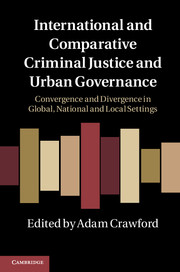 International and Comparative Criminal Justice and Urban Governance
International and Comparative Criminal Justice and Urban Governance Book contents
- Frontmatter
- Contents
- List of figures
- List of tables
- Notes on contributors
- Acknowledgements
- 1 International and comparative criminal justice and urban governance
- PART 1 International criminal justice
- 2 Unintended justice: the United Nations Security Council and international criminal governance
- 3 The International Criminal Court and the state of the American exception
- 4 Universal crimes, universal justice? The legitimacy of the international response to genocide, crimes against humanity and war crimes
- 5 Locating victim communities within global justice and governance
- 6 Dealing with war crimes in Bosnia: retributive and restorative options through the eyes of the population
- 7 Shaping penal policy from above? The role of the Grand Chamber of the European Court of Human Rights
- PART 2 Comparative penal policies
- PART 3 Comparative crime control and urban governance
- Index
- References
5 - Locating victim communities within global justice and governance
from PART 1 - International criminal justice
Published online by Cambridge University Press: 05 June 2011
- Frontmatter
- Contents
- List of figures
- List of tables
- Notes on contributors
- Acknowledgements
- 1 International and comparative criminal justice and urban governance
- PART 1 International criminal justice
- 2 Unintended justice: the United Nations Security Council and international criminal governance
- 3 The International Criminal Court and the state of the American exception
- 4 Universal crimes, universal justice? The legitimacy of the international response to genocide, crimes against humanity and war crimes
- 5 Locating victim communities within global justice and governance
- 6 Dealing with war crimes in Bosnia: retributive and restorative options through the eyes of the population
- 7 Shaping penal policy from above? The role of the Grand Chamber of the European Court of Human Rights
- PART 2 Comparative penal policies
- PART 3 Comparative crime control and urban governance
- Index
- References
Summary
The eyes of victims of past crimes and of the potential victims of future crimes are fixed firmly upon us.
Kofi Annan opening the ICC Rome ConferenceIntroduction
Those who would like to see the international criminal trial remain a retributive endeavour reflecting the conventional features and characteristics of domestic trials are concerned that enhancing victim constituency for the international trial process will endanger its limited potential success (Judah and Bryant 2003). Some critics declare that the International Criminal Tribunal for the former Yugoslavia (ICTY) in particular has achieved legitimacy through the effective prosecution of significant offenders important to many victim communities (Findlay and McLean 2007). In this, it is argued, lies sufficient justification for the expansion of a retributive international trial process in the form of the International Criminal Court (ICC). In addition, the disclosure debacle around the first ICC indictment, which clearly divided the interests of the prosecutor and of victims heightens the challenges to conventional trial positioning if victim interests are given standing.
Despite such narrower legalist assertions the ICC, and its prosecutor, have claimed more universalist justifications in the form of the court's potential to assist in state reconstruction and peacemaking. Further, the ICC and the international tribunals which precede it have within their authorising legislation growing recognition of victim interests, even if this remains largely outside the processes of trial decision making.
- Type
- Chapter
- Information
- International and Comparative Criminal Justice and Urban GovernanceConvergence and Divergence in Global, National and Local Settings, pp. 109 - 139Publisher: Cambridge University PressPrint publication year: 2011
References
- 2
- Cited by


